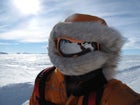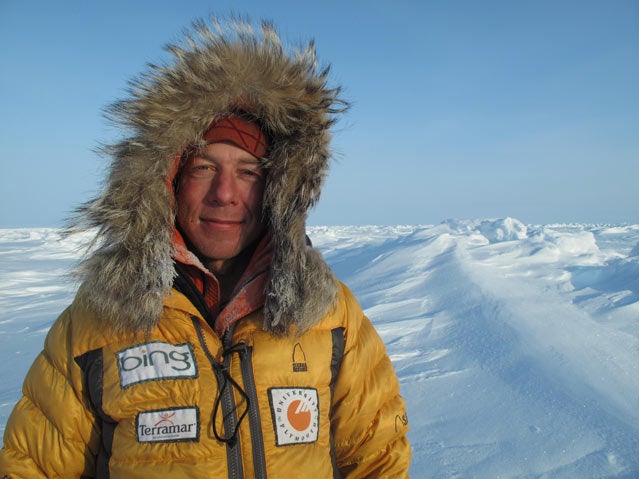Eric Larsen is a polar explorer, dog musher, and cyclist who lives for cold places. In 2006, he completed the first summer expedition to the North Pole, and, in late 2010, finished his year-long expedition to the polar trifecta—the North and South poles and the top of Everest—to expose the changes in those diminishing environments. His film documents the adventure. Larsen will lead an outing in hiking and high-altitude trail running at this year.
 Eric Larsen in the cold
Eric Larsen in the coldWhat have you been up to since your Save the Poles expedition?
I spent most of 2011 traveling around doing presentations and paying off my debt. A big part of my mission was getting the story of my expedition out, and that’s still ongoing. I also spent November, December and January down in Antarctica guiding and leading some trips down there. It was fun to be back in Antarctica. Then I was up in Hudson Bay in Churchill Manitoba in March doing some training and filming.
Were you training for anything in particular?
Yeah, I was doing some winter biking. I’m not ready to say what the trip is yet, but it’s going to be a groundbreaking expedition involving a bike and winter.
Sounds like it could be interesting.
I think it will be really cool. I’ve been a biker forever, and I used to race. I remember when I graduated college I wanted to pursue bike racing. But I also really wanted to go to wild places and explore. I thought I couldn’t have it both ways, but the new fat tire bikes being developed now are just incredible. So, for me, it’s the ability to do two things I really love together.
What sort of impact has your Save the Poles expedition and the resulting film Colder had on you, as well as in a larger sense?
In the first sense, the end of any big project is always a bit of a letdown. I spent three-and-a-half years preparing and training, and everything was focused on that one thing. That really defines your life, so when it’s over, there’s a kind of empty feeling. Overall, I think the impact of the expedition is still being measured. With an expedition, the lessons unfold slowly, not only for me but also for the larger public. It definitely provides me with a strong platform to talk about some of the things that I’ve seen and creates a legacy that allows me to engage people in the topic in an interesting way. I feel like that expedition has legs for quite a while longer. That’s one of the things that differentiates what I’m about versus doing some ski off a big cliff. Not that I don’t think that’s amazing, but I think it’s a very insular thing and a moment in which people are engaged. But then it passes. I hope Save the Poles provides some discussion and reflection.
What are your long-term goals and hopes as an environmentally-concerned explorer?
One of the things about expeditions that has become apparent to me is this idea of need versus want. On these trips, we’re obviously using a lot of resources to get to these places, and I try to mitigate those things as much as I can through carbon offsets. But you’re living without a lot of stuff for a long time. You realize how little we need to live and survive and be comfortable. So I hope that philosophy will permeate through everything that I do in the future on an expedition level and a personal level. But my goal is to continue to tell the stories of these places, and I think that’s evolving to involve a more substantial use of media—video and images—because those are powerful tools. Being able to connect people in real time. Not everyone has the ability or desire to go to these places, but it doesn’t mean they’re not interested. I want to continue to use these expeditions to talk about these issues that are bigger than myself.
Who do you admire, in terms of people doing meaningful exploration?
I’m a fan of every adventure. The idea of pushing personal ability is really interesting to me. I’m not doing anything original in terms of using expeditions as tools. I love what other people are doing, and I try to follow as many expeditions as I can. These experiences are personal to each individual; there’s a lot of room for different perspectives in the adventure world.
There’s a good program that connects to help scientists who can’t afford or don’t have the ability to go to certain places to collect samples or data. I think that’s a cool idea. I think the group is doing a lot of great advocacy. There are some amazing athletes who are guides. I think the whole guiding realm is important for conservation and stewardship in building a connection for people to wilderness.
Is exploration essentially different today than, say, a century ago in its purposes and repercussions?
I think it depends on who you are. Overall, yes, exploration is much different today. I call myself an explorer, but that’s sort of a generic term that polar travelers were always called. Exploration is a couple of different things: it’s pushing human limits and technological limits. That’s one realm where exploration is still pioneering. In the other sense, it’s different because the world is discovered. Everything’s got a GPS point on it. When I travel to the South Pole, I’m using a GPS and skiing toward that point, which is pretty straightforward.
What’s the most rewarding aspect of your chosen profession?
For me, it’s unlimited. The fact that I actually get to do it is a dream come true. On a personal level, it’s trying to solve the problems that expeditions present—the physical, mental, logistical, gear—and overcoming those is a big reward. It’s a lot of stress, and it’s hard when you’re out there, but the reward is great. Being in those places where so few people have ever been and not interacting with people on a regular basis is pretty incredible.
The most rewarding thing for me is being able to engage a global audience in real time. To be able to bring these places back to people’s offices, living rooms, computer screens in a variety of ways to get people completely engaged. Facebook and Twitter have changed the dynamic; it’s not just a one-way conversation. That ability to reach people in a viral way and interact with them is one of the pioneering aspects of exploration now, and it’s one of the most satisfying things for me.
, June 8-10, is a weekend filled with outfitter-led adventure, including mountain and road biking, kayaking, rafting, trail running, fly-fishing, hiking, stand-up river paddling, and rock climbing for all skill levels. The weekend also includes parties, a base camp featuring ���ϳԹ���’s Gear of the Year, a symposium with professional adventure athletes and ���ϳԹ��� personalities.


